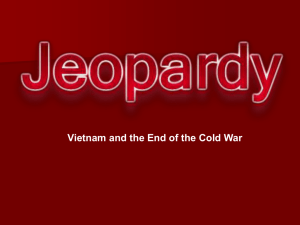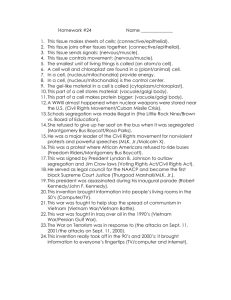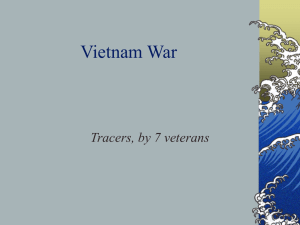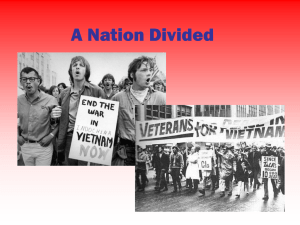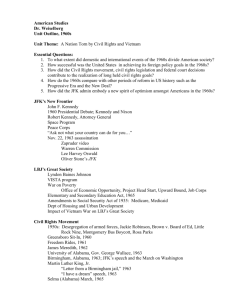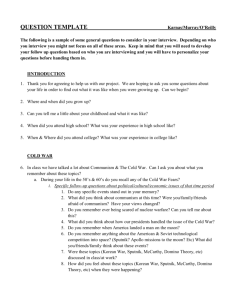Bibliography of the “divisive” 1960s Andrew, John. Lyndon Johnson
advertisement
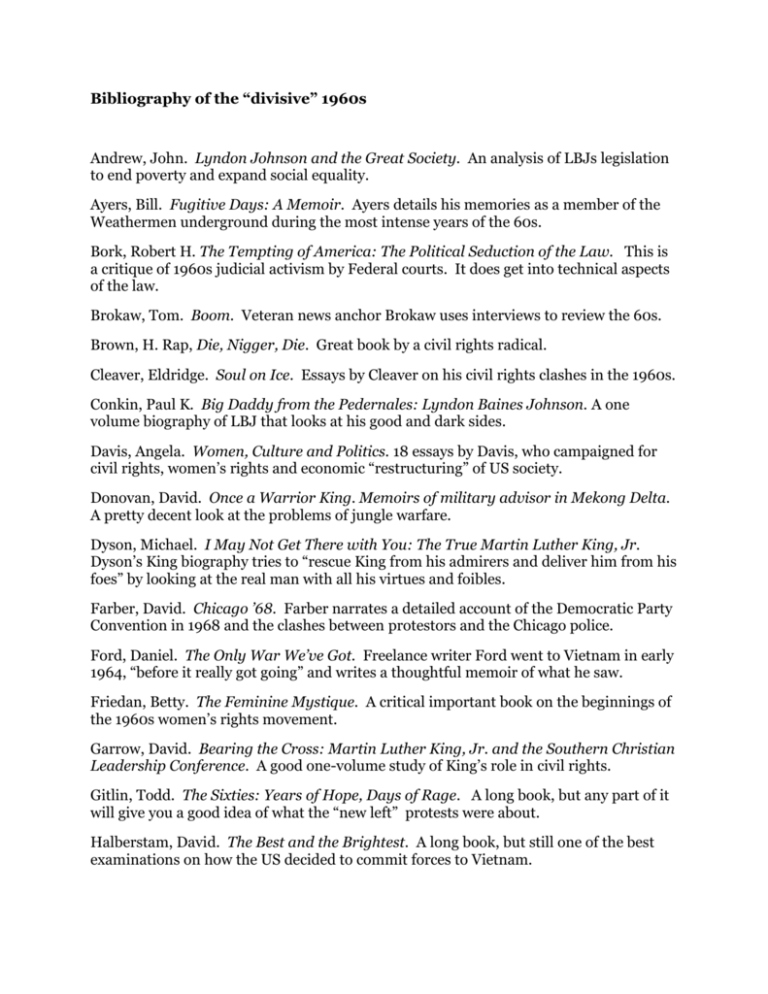
Bibliography of the “divisive” 1960s Andrew, John. Lyndon Johnson and the Great Society. An analysis of LBJs legislation to end poverty and expand social equality. Ayers, Bill. Fugitive Days: A Memoir. Ayers details his memories as a member of the Weathermen underground during the most intense years of the 60s. Bork, Robert H. The Tempting of America: The Political Seduction of the Law. This is a critique of 1960s judicial activism by Federal courts. It does get into technical aspects of the law. Brokaw, Tom. Boom. Veteran news anchor Brokaw uses interviews to review the 60s. Brown, H. Rap, Die, Nigger, Die. Great book by a civil rights radical. Cleaver, Eldridge. Soul on Ice. Essays by Cleaver on his civil rights clashes in the 1960s. Conkin, Paul K. Big Daddy from the Pedernales: Lyndon Baines Johnson. A one volume biography of LBJ that looks at his good and dark sides. Davis, Angela. Women, Culture and Politics. 18 essays by Davis, who campaigned for civil rights, women’s rights and economic “restructuring” of US society. Donovan, David. Once a Warrior King. Memoirs of military advisor in Mekong Delta. A pretty decent look at the problems of jungle warfare. Dyson, Michael. I May Not Get There with You: The True Martin Luther King, Jr. Dyson’s King biography tries to “rescue King from his admirers and deliver him from his foes” by looking at the real man with all his virtues and foibles. Farber, David. Chicago ’68. Farber narrates a detailed account of the Democratic Party Convention in 1968 and the clashes between protestors and the Chicago police. Ford, Daniel. The Only War We’ve Got. Freelance writer Ford went to Vietnam in early 1964, “before it really got going” and writes a thoughtful memoir of what he saw. Friedan, Betty. The Feminine Mystique. A critical important book on the beginnings of the 1960s women’s rights movement. Garrow, David. Bearing the Cross: Martin Luther King, Jr. and the Southern Christian Leadership Conference. A good one-volume study of King’s role in civil rights. Gitlin, Todd. The Sixties: Years of Hope, Days of Rage. A long book, but any part of it will give you a good idea of what the “new left” protests were about. Halberstam, David. The Best and the Brightest. A long book, but still one of the best examinations on how the US decided to commit forces to Vietnam. Hearden, Patrick, ed. Vietnam: Four American Perspectives. A fascinating book in that four major figures in the war (George McGovern being one) give their views of the war. Herr, Michael. Dispatches. Herr covered the war as a journalist and offers many insights. Hersey, John. The Algiers Motel Incident. Account of the 1967 riots in Detroit by a Pulitzer prize winning author. Hersh, Seymour. My Lai. Hersh’s account of how he broke the My Lai massacre. Hilsman, Roger. To Move a Nation: The Politics of Foreign Policy in the Administration of John F. Kennedy. Hilsman served in the JFK administration and discusses the Cuba issue, Vietnam and other aspects of foreign affairs. Horne, Gerald. Fire This Time: The Watts Uprising. Good account of the Los Angeles race riot in 1965. Katz, Michael B. The Undeserving Poor: From the War on Poverty to the War on Welfare. Katz examines JBJ’s war on poverty. Kearns, Doris. Lyndon Johnson and the American Dream. Kearns (later Kearns Goodwin) uses interviews to examine LBJ’s character. Kennedy, Robert. Thirteen Days: A Memoir of the Cuban Missile Crisis. Account of the missile crisis by JFK’s brother. Kimball, Roger. Tenured Radicals. A conservative critique of college professors who urged students to protest against the war. Kutler, Stanley I. The Wars of Watergate: The Last Crisis of Richard Nixon. A detailed look at the crisis that cost Nixon his presidency. McNamara, Robert S. In Retrospect: The Tragedy and Lessons of Vietnam. Published 30 years after he was secretary of defense, McNamara reviews his role in the war. McDougall, Walter. The Heavens and the Earth: The History of Space Exploration. A great narrative of the quest for the moon McGinnis, Joe. The Selling of the President, 1968. A wonderful book on how Nixon’s image was remade to get him elected. Mailor, Norman. The Armies of the Night. The famous author tells his story (in 3rd person yet!) of being in the anti-war movement. Malcolm X, with Alex Haley. Autobiography of Malcolm X. Brillian early book by the author of Roots. Michener, James. Kent State: What Happened and Why. A “narrative investigation” of the killing of students in Ohio during an anti-war protest. Pichaske, David. A Generation in Motion: Popular Music and Culture in the Sixties. A pretty good overview of 60s films and how they changed cinema. Posner, Gerald L. Case Closed: Lee Harvey Oswald and the Assassination of JFK. The most detailed account arguing that Oswald did it. Reeves, Thomas C. A Question of Character: A Life of John F. Kennedy. A look at the secrets JFK kept. Rose, Mark H. Interstate: Express Highway Politics, 1939-1989. How The US was transformed by 4-lane highways. Sale, Kirkpatrick. SDS. Sale, a sympathetic journalist, looks at the activities of the Students for a Democratic Society. Sheehan, Neil. A Bright Shining Lie: John Paul Vann and America in Vietnam. Possibly the best single book on America in Vietnam. Sides, Hampton. Hellhound on His Trail. Excellent account of the assassination of Martin Luther King and the apprehension of his killer. Summers, Anthony. Not in Your Lifetime. One of the most detailed books that argues JFK’s assassination was the result of a complex conspiracy. Wells, Tom. The War Within: America's Battle Over Vietnam. Very long, but any part gives good detail on anti-war activities. White, Theodore. The Making of the President, 1960. Journalistic account of how an in-experienced US Senator became the youngest man elected president. Wiener, Jon. Come Together: John Lennon in His Time. A good overview of music in the sixties, with the Beatle, Lennon, as the focal point. Wolfe, Tom. The Right Stuff. An enthralling narrative of the US space program by “new journalist” Wolfe.
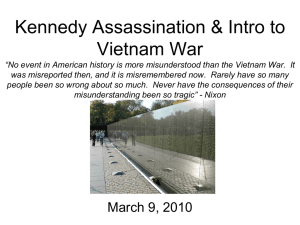

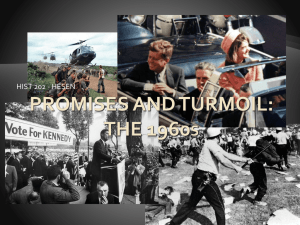
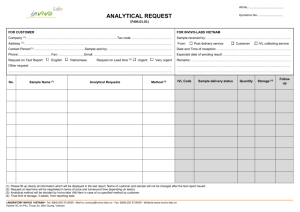
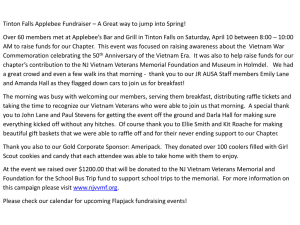
![vietnam[1].](http://s2.studylib.net/store/data/005329784_1-42b2e9fc4f7c73463c31fd4de82c4fa3-300x300.png)
